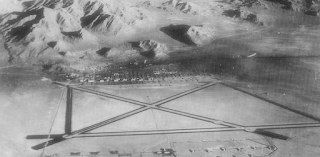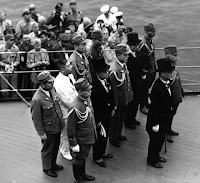DATE: October 5, 2015
HISTORICAL
SITE: Wendover Airfield
LOCATION: Wendover, Toole Co., Utah 84083
MARKER #: 75001827
PERSONAL
REFLECTIONS:
There’s a driving tour but we didn't take it. It was hard enough finding the museum. Instead we watched
a video in the museum which, in the end, was a vehicle for asking for
donations. The exhibits were interesting and I hadn’t realized how much of a
connection there was between Wendover Airfield and the bombings of Japan.
 |
In 1940, Congress funded a base that was to be a bombing and
gunnery range. Locations were scouted and Wendover was chosen because of
availability and barrenness of the land. Ranchers protested saying the loss of
1.8 million acres of grazing land would wipe them out. The federal government
kept going and building commenced in 1941.
In August 1941, one officer and 10 men moved in, with another
37 men coming soon after. The first course of business for these initial men
was to set up targets on the salt flats. Eventually, because of the amount of
salt, a “salt city” was built for bombing practice.
Training for the B-17 and B-24 bombers commenced in 1942. In
the end, 21 bomber groups and over 1,000 aircrew were trained. These groups participated
in strategic bombing in Germany, flew in support of D-Day and 3 groups are
Medal of Honor recipients.
In 1944, the base changed from training bomber groups to fighter
pilot training, but only 3 groups were graduated.
Unknown to most, the “Manhattan Engineer District” was
established by FDR and a Colonel Tibbets was selected to head the team. Tibbets
was one of very few who knew of the project and chose Wendover Airfield because
of its isolation and the fact that it was virtually uninhabited.
With very little advanced notice, much haste and no
explanation, the fighter pilot training was out and part of a unit based in the
Marianna Islands was moved in.
 |
| Enola Gay Hanger |
On December 17, 1944, 1,767 officers and men moved in,
including civilian and military scientists. They were housed separately than
the rest of the base. Information on their mission was so restricted that even
members of the unit did not know the purpose of their training.
For the next six months, they tested 155 different shapes and
sized bombs. As information came in, more and more complicated and
sophisticated versions of “Fat Man” and “Little Boy” bombs were developed.
 Not long after, President Truman warned Japan of a bomb of
extraordinary destruction…Japan chose to ignore the warning. There has been
disagreement over the term “warning”, but it seemed to come in several forms.
Not long after, President Truman warned Japan of a bomb of
extraordinary destruction…Japan chose to ignore the warning. There has been
disagreement over the term “warning”, but it seemed to come in several forms.
The first to the Japanese government which is called the
“Potsdam Declaration” ended with:
“We call upon the government of Japan to proclaim now the
unconditional surrender of all Japanese armed forces, and to provide proper and
adequate assurances of their good faith in such action. The alternative for
Japan is prompt and utter destruction.”
Some argue this is hardly a warning
that the atomic bomb will be dropped but rather an ultimatum for peace.
The second “warning” were leaflets
dropped on the population of several cities purported to be the ones being
considered for bombing. The leaflets say:
"Read this carefully as it may save your life or the life of a relative or a friend. In the next few days, four or more of the cities named on the reverse side of this leaflet will be destroyed by American bombs. These cities contain military installations and workshops or factories, which produce military goods. We are determined to destroy all of the tools of the military clique that they are using to prolong this useless war. Unfortunately, bombs have no eyes. So, in accordance with America's well-known humanitarian policies, the American Air Force, which does not wish to injure innocent people, now gives you warning to evacuate the cities names and save your lives. America is no fighting the Japanese people but is fighting the military clique, which has enslaved the Japanese people. The peace, which America will bring, will free the people from the oppression of the Japanese military clique and mean the emergence of a new and better Japan. You can restore peace by demanding new and better leaders who will end the War. We cannot promise that only these cities will be among those attacked, but at least four will be, so heed this warning and evacuate these cities immediately."
The argument here is that this warning also says nothing about
atomic bombs and that maybe the plan was more along the lines of psychological
warfare than a true warning. Some say the Japanese population was already used
to being bombed, so how could this have been any different?
On August 6, 1945, at 9:15am, the Enola Gay, having taken off
from the Marianna Islands dropped “Little Boy” on Hiroshima, Japan and three
days later, “Fat Man” was dropped on Nagasaki. The estimated total causalities
were approximately 105,000 killed in the initial blasts with an additional
94,000 injured.
Another bomb shell was being ready to ship to the Marianna
islands and there was enough plutonium stored at Los Alamos for one more bomb, but
it was halted due to the impending surrender of Japan.
Wendover Airfield continued to produce “pumpkin” bombs and
components for the atomic bombs until the end of the war
Immediately following the war, the men, and some of the
buildings were moved to Oxnard, California to what would become Sandia Base.
Wendover Airfield would be activated, re-tooled and then deactivated over the
course of next 25 years. It would be instrumental in the development and
testing of various bombs and rockets.
 Regardless of the public opinion of the use of the atomic bomb
against civilian and military targets, it cannot be argued that this caused
Japan to surrender. The argument is whether the price was worth the cost, but
then, how many would have died if the war had continued on as it had? Even
Colonel Tibbets said we must try to understand “the necessity for the decisions
of the time”.
Regardless of the public opinion of the use of the atomic bomb
against civilian and military targets, it cannot be argued that this caused
Japan to surrender. The argument is whether the price was worth the cost, but
then, how many would have died if the war had continued on as it had? Even
Colonel Tibbets said we must try to understand “the necessity for the decisions
of the time”.
Once Dirk and I were done with the museum, the woman invited
us to climb to the top of the control tower which, being from a litigious state
such as California, was quite the surprise. I was able to make it about half
way before feeling a bit of panic setting it but Dirk made it to the top and
made the following SnapChat video.







